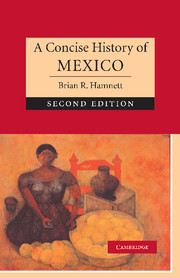Book contents
- Frontmatter
- Contents
- List of illustrations
- Chronology
- Preface to the second edition
- Preface to the first edition
- 1 Mexico in perspective
- 2 The pre-Columbian era
- 3 The European incursion, 1519–1620
- 4 New Spain, 1620–1770: Spanish colonialism and American society
- 5 Destabilisation and fragmentation, 1770–1867
- 6 Reconstruction, 1867–1940
- 7 The monopoly party, 1940–2000
- 8 The Fox administration, 2000–2006
- 9 Cultural developments since Independence
- Final comments
- Bibliography
- Index
- Titles in the series
8 - The Fox administration, 2000–2006
Published online by Cambridge University Press: 05 June 2014
- Frontmatter
- Contents
- List of illustrations
- Chronology
- Preface to the second edition
- Preface to the first edition
- 1 Mexico in perspective
- 2 The pre-Columbian era
- 3 The European incursion, 1519–1620
- 4 New Spain, 1620–1770: Spanish colonialism and American society
- 5 Destabilisation and fragmentation, 1770–1867
- 6 Reconstruction, 1867–1940
- 7 The monopoly party, 1940–2000
- 8 The Fox administration, 2000–2006
- 9 Cultural developments since Independence
- Final comments
- Bibliography
- Index
- Titles in the series
Summary
THE ECONOMY
The Fox administration benefited from a largely stable and expanding economy. The peso gained a new stability after a period of weakness between 1997 and 2000 and grew stronger by late 2005. Prices remained relatively stable, and oil revenues acquired fresh buoyancy. The picture, however, was not entirely rosy, especially in view of the far-reaching implications of continued government dependence on oil revenues. Although higher oil prices benefited Mexico considerably, since it removed the need for budget cuts in education or health, US interests considered themselves to be adversely affected. Since 88 per cent of Mexico's exports in 2005 continued to be to the USA, the economy remained vulnerable to weaknesses and fluctuations there. Even so, by September 2005, Mexico had a trade surplus of US$52.2 billion with the USA. The business orientation of the Fox administration did not lead to radical changes in policy direction, since policies favouring the private sector had already been set in motion under Salinas. In many respects, the Fox administration, despite the change of party in power, represented in practice little change with respect to economic policy.
In 2000, the Mexican government still took 37 per cent of its total revenue from the oil industry, dominated by the state-owned PEMEX. Each fall of US$1 per barrel in the export price of Mexican oil could cause the Mexican Treasury to lose US$600 or more in revenue.
- Type
- Chapter
- Information
- A Concise History of Mexico , pp. 292 - 309Publisher: Cambridge University PressPrint publication year: 2006

